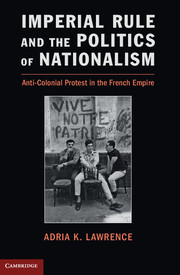Book contents
- Frontmatter
- Contents
- List of Figure and Tables
- Preface
- Acknowledgments
- 1 Introduction
- 2 Indigènes into Frenchmen? Seeking Political Equality in Morocco and Algeria*
- 3 Political Equality and Nationalist Opposition in the French Empire
- 4 Empire Disrupted
- 5 Nationalist Mobilization in Colonial Morocco
- 6 Conclusion
- Bibliography
- Index
6 - Conclusion
Published online by Cambridge University Press: 05 June 2014
- Frontmatter
- Contents
- List of Figure and Tables
- Preface
- Acknowledgments
- 1 Introduction
- 2 Indigènes into Frenchmen? Seeking Political Equality in Morocco and Algeria*
- 3 Political Equality and Nationalist Opposition in the French Empire
- 4 Empire Disrupted
- 5 Nationalist Mobilization in Colonial Morocco
- 6 Conclusion
- Bibliography
- Index
Summary
Looking back at the end of the era of European colonialism, it is easy to tell a story in which nationalist protest appears unavoidable, the utmost and final “stage” of anti-colonialism. But an interpretation that privileges nationalist modes of opposition fails to makes sense of how challenges to colonial rule varied. The history of nationalist movements in the colonial world is uneven: opponents of imperialism employed multiple anti-colonial discourses other than nationalism, and they were restricted by a colonial state that sought to shut down contestation. This book has argued that nationalism was not bound to triumph in French empire for two reasons: political equality offered an alternative remedy for the injustices of imperial rule; and nationalist protest required opportunities that were not easy to come by under authoritarian governments.
The anti-colonial theorist Frantz Fanon (1963, 148) acknowledges that responses to colonial rule varied, writing: “History teaches us clearly that the battle against colonialism does not run straight away along the lines of nationalism.” He persists, however, in telling a teleological story in which nationalist responses must prevail: “For a very long time the native devotes his energies to ending certain definite abuses: forced labor, corporal punishment, inequality of salaries, limitation of political rights, etc. This fight for democracy against the oppression of mankind will slowly leave the confusion of neo-liberal universalism to emerge, sometimes laboriously, as a claim to nationhood” (ibid.). Fanon sees “neo-liberal universalism” as fatally flawed, a misguided form of anti-colonialism destined to give way to nationalism. In contrast, in the first half of this book, I advocated taking aspirations for political equality seriously. In Chapter 2, I asserted that demands for equality were not embryonic forms of nationalism. I drew a stark distinction between calls for a higher degree of equality and nationalist claims because of the tendency to overlook the former and portray the latter as the pervasive form of anti-colonialism. These demands are conceptually different; calls for equality are not reducible to nationalism, although activists sometimes drew on both discourses, proposing arrangements such as federalism that reflected concerns for both equality and the recognition of national distinctiveness.
- Type
- Chapter
- Information
- Imperial Rule and the Politics of NationalismAnti-Colonial Protest in the French Empire, pp. 214 - 234Publisher: Cambridge University PressPrint publication year: 2013



